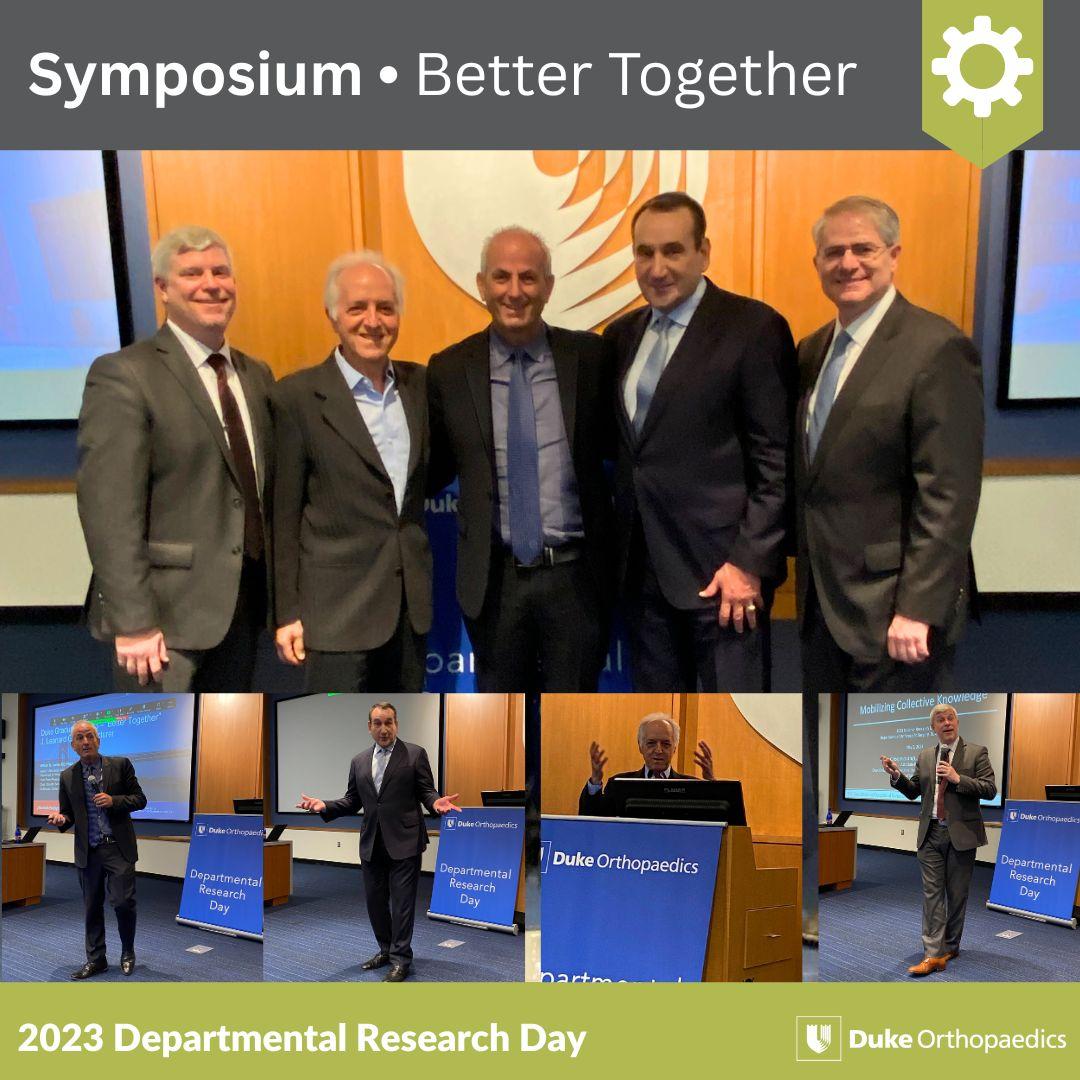Better Together: Tips from Top Medicine and Sport Leaders

Being inclusive. Holding people accountable. Being courageous yet vulnerable. Recognizing the talents of every team member. Cultivating ownership.
These are just some of the answers that "Better Together" Symposium speakers shared to answer the big question about how to build the best team.
The symposium featured Duke Head Basketball Coach Mike Krzyzewski; William Levine, MD, who chairs the Department of Orthopedic Surgery at Columbia University; Shawn Roll, PhD, who directs the doctoral program in Occupational Therapy at the University of Southern California; and Maurizio Pacifici, PhD, who directs Orthopaedic Research at Children's Hospital of Philadelphia.
Krzyzewski compared building a great Duke Orthopaedics team to his experiences coaching the USA Basketball team, garnering some laughs when comparing the egos of NBA legends to those of Duke physicians.
He said he worked with other coaches that told players to "leave their egos at the door."
"I have never believed in that; I want you to bring all of your egos in," he said, saying that a team makes up "one ego umbrella."
He told greats like Kobe Bryant and LeBron James that they were not "playing for the United States (Olympic team), you are the United States Olympic team."
The former coach said the same applies to Duke Orthopaedics.
"I will tell all of you that if you want to be number one and do the best, you are not working for Duke Orthopaedics; you have to be Duke Orthopaedics," he said. "You have to own it, and the only way to own it is to share what you hear and see, but to share what you feel because if you feel, it will hit your heart."
He also emphasized finding ways for professionals to connect with "their 16-year-old selves" to remind themselves of the wonder and awe they felt when first connecting their talents and skills to doing something they love.
He added that people who lead the best teams find ways to cultivate and meld talent.
"The biggest thing that stops teams from improving is adaptability – the ability to keep changing. And the best way to adapt is through communication and how you speak to one another."
Levine, who has overseen large-scale cultural changes at Columbia, also stressed the power of communication as essential to improving efficiencies and the overall work environment. He worked with a team transforming orthopedic healthcare delivery through a multidisciplinary approach to enhancing the quality, safety, value, satisfaction, and overall patient experience across adult and pediatric orthopedic subspecialties. The department uses the Comprehensive Unit-Based Safety Program (CUSP) model, which includes physicians, nurses, and other clinical team members to improve processes across the healthcare system.
"It's important to communicate early, often, and consistently," Levine said.
He also emphasized the importance of talent positioning.
"It's important to get the right people on the bus, get the wrong people off the bus, and to make sure that the people on the bus are on the right seats," he said.
Levine also stressed the importance of having a shared scoreboard. "Metrics are key; make sure people understand what your goals are for your organization so that everyone can be rowing the boat in the same direction," Levine said.
Shawn Roll, PhD, OTR/L, RMSKS, FAOTA, FAIUM, provided insight about leading teams of researchers to advance collective knowledge in a way that incorporates diverse expertise and points of view.
Roll shared a graphic of a bicycle to illustrate how each mechanical component works to move the machine forward.
"What is important here is who is riding the bike?" he asked, pointing to the importance of stakeholder engagement. "Who are the people that this work will be impacting? Are they in control; are they driving this?"
He pointed to the bicycle's hand brakes.
"We should always take time for the research team to step away and for the stakeholders also to take a step back," he said. "It's always important to make sure that what you are doing is moving things forward, whether it's research, practice, education, wherever you are."
Pacifici shared his views on the importance of making patients and their families members of the team and how that inspired his successful work in developing treatments for fibrodysplasia ossificans progressiva (FOP) and heterotopic ossification (HO). Working closely with patients and families has inspired solutions and set parameters for new research directions.
Watch the Symposium or other Research Day sessions here.